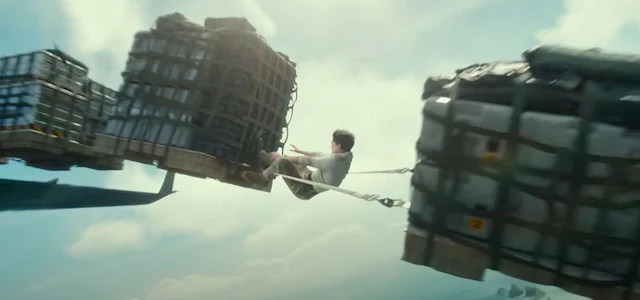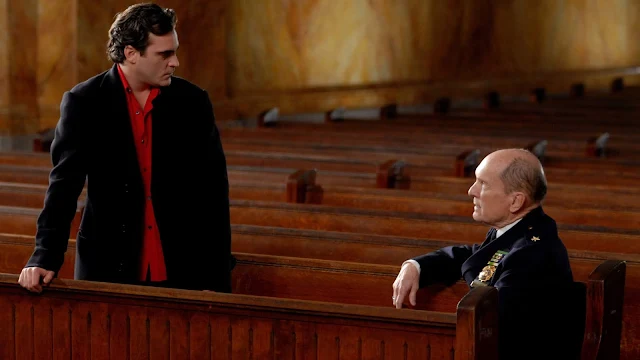I almost stopped watching Tim Burton's remake of Franklin J. Schaffner's 1968 classic Planet of the Apes when one character called another "the Homo sapien." Can we all get it into our heads that the taxonomic phrase "Homo sapiens" is singular? (If there were a plural it would be something like "Homines sapientes" -- Latinists may correct me if I'm wrong.) But pet peeves aside, I found Burton's version entertaining enough, with its sly references to the original film: One of the apes reverses a line spoken by Charlton Heston in the first film, saying "Get your stinking hands off me, you damn dirty human!" And Heston himself has an unbilled cameo as the dying father of Thade (Tim Roth), in which he reprises in a different context his line, "Damn them! Damn them all to hell!" The apes in the remake are more simian, with better ape-like behavior and movements. And the satiric edge feels sharper in an era in which government-sanctioned discrimination seems to be on the rise. But the narrative is a bit of a mess, especially the fudged-up ending, which could never have the impact of the revelation at the end of the 1968 film. It got a Razzie as the worst remake of the year and probably deserved it, but it's not unwatchable, thanks to some good performances, especially by Helena Bonham Carter, Michael Clarke Duncan, and Paul Giamatti, who never let the makeup do the acting for them.
A blog formerly known as Bookishness / By Charles Matthews
"Dazzled by so many and such marvelous inventions, the people of Macondo ... became indignant over the living images that the prosperous merchant Bruno Crespi projected in the theater with the lion-head ticket windows, for a character who had died and was buried in one film and for whose misfortune tears had been shed would reappear alive and transformed into an Arab in the next one. The audience, who had paid two cents apiece to share the difficulties of the actors, would not tolerate that outlandish fraud and they broke up the seats. The mayor, at the urging of Bruno Crespi, explained in a proclamation that the cinema was a machine of illusions that did not merit the emotional outbursts of the audience. With that discouraging explanation many ... decided not to return to the movies, considering that they already had too many troubles of their own to weep over the acted-out misfortunes of imaginary beings."--Gabriel García Márquez, One Hundred Years of Solitude
Search This Blog
Friday, March 14, 2025
Planet of the Apes (Tim Burton, 2001)
Thursday, January 25, 2024
The Yards (James Gray, 2000)
 |
| Mark Wahlberg and Joaquin Phoenix in The Yards |
Cast: Mark Wahlberg, Joaquin Phoenix, Charlize Theron, James Caan, Ellen Burstyn, Faye Dunaway, Steve Lawrence, Andy Davoli, Tony Musante, Victor Argo, Tomas Milian, Robert Montano. Screenplay: James Gray, Matt Reeves. Cinematography: Harris Savides. Production design: Kevin Thompson. Film editing: Jeffrey Ford. Music: Howard Shore.
With its powerhouse cast acting glum, The Yards is a slow downer of a movie. But it repays attention, immersing us in an almost too-familiar milieu, the Mean Streets of New York City. It's more elegiac than the visions of the milieu given us by Scorsese, Coppola, Lumet and many others, portraying a city almost beyond hope and reform, in which the well-meaning can be dragged down by circumstance. Leo Handler (Mark Wahlberg) is certainly well-meaning: Just out of prison for a crime for which he took the fall for his friends, he would like to stay straight if only to help his ailing mother (Ellen Burstyn), but the corruption that is eating his friends and family, particularly his friend Willie Gutierrez (Joaquin Phoenix) and his uncle Frank (James Caan), is bound to swallow him up, too. Eventually, meaning well is not enough, and Leo finds himself taking the fall again. In the end, it turns out that the only way to fight the kind of corruption that ensnares Leo is with corruption itself, a truly vicious cycle. James Gray's steady, slow direction probably tested audiences too much, for the film was a box office loser. But it boasts superb ensemble work, with standout performances from Phoenix and Caan and particularly from Charlize Theron as Erica, Leo's cousin and Willie's girfriend. Howard Shore's music underscores Gray's melancholy vision.
Sunday, September 4, 2022
Uncharted (Ruben Fleischer, 2022)
Cast: Tom Holland, Mark Wahlberg, Antonio Banderas, Sophia Ali, Tati Gabrielle, Steven Waddington, Pingi Moli. Screenplay: Rafe Judkins, Art Marcum, Matt Holloway. Cinematography: Chung-hoon Chung. Production design: Shepherd Franklin. Film editing: Chris Lebenzon, Richard Pearson. Music: Ramin Djawadi.
Tom Holland is such a likable actor, with true screen presence, that I wish him well in his attempts to venture beyond the Spider-Man franchise. But Uncharted won’t do. It’s action for action’s sake, scrapping all laws of physics and probability for the sake of its thrills. I mean, it opens with a sequence that features Holland’s Nathan Drake on a string of cargo bales that are dangling from the back of an airplane. Drake jumps forward from bale to bale, defying gravity and wind speed, even though the same wind keeps sweeping his pursuers off to their doom. I knew from that moment that the only thing to do was relax and treat the movie like the live action equivalent of a Road Runner cartoon, the ones in which Wile E. Coyote runs off a cliff and remains suspended in air before he notices what he’s done. I’ve suspended disbelief for many scenes in an Indiana Jones or James Bond film, but Uncharted tested my limits – and failed. Still, Holland does what he can with the material, and he’s fun to watch doing dumb stunts. Mark Wahlberg is there for the buddy movie aspect, and Antonio Banderas is wasted in the role of the villain. Sophia Ali and Tati Gabrielle play treacherous women, and even though Ali’s and Holland’s characters share a room and a bed in one scene, there’s scarcely a hint of sex and romance. It’s all based on a series of video games that I haven’t played, and I guess there was some resistance to the film from those who have, but mainly about the casting choices.
Thursday, September 24, 2020
The Fighter (David O. Russell, 2010)
 |
| Christian Bale, Melissa Leo, and Mark Wahlberg in The Fighter |
You don't have to be familiar with the real-life Micky Ward to know that the movie about him is going to end with the scrappy underdog coming from behind to win the championship. All you need is to be familiar with the genre of sports movies, especially boxing movies, to which The Fighter belongs. And you don't have to know much about the acting careers of Christian Bale and Melissa Leo to know that they were shoo-ins for the Oscars for best performances in supporting roles. All you need to know is that the Academy loves flamboyant acting in roles as working-class characters. If that sounds a little cynical, I don't really mean it that way: Bale and Leo deserved their awards, partly because they help bring a perhaps overfamiliar (not to say clichéd) story to life. The Fighter works because it's nuanced and textured in ways that films heavily shadowed by genre history have to be in order to hold our interest. And a lot of the nuance and texture was contributed by the less showy performances of Mark Wahlberg and Amy Adams -- and she at least got a nomination. It helps, too, that Wahlberg, who grew up in a Boston-area working class neighborhood much like the Lowell of the film, loved the story and its characters, and as producer made it work. You might gather from my opening that boxing movies are a genre I don't have a great fondness for, and you'd be right. But there's a lot to enjoy about The Fighter, including the ambience Wahlberg probably had a lot of say in creating, like the chorus of Micky Ward's big-haired sisters, waiting to pounce on an intruder like Charlene Fleming (Adams) who had the effrontery to go to college but return to the neighborhood and claim equality. The fight scenes are well-done, I guess, and I couldn't help getting caught up in their momentum. Still, it'll be a while before I choose to watch another boxing movie.
Thursday, September 26, 2019
We Own the Night (James Gray, 2007)
We Own the Night (James Gray, 2007)
Cast: Joaquin Phoenix, Mark Walhberg, Robert Duvall, Eva Mendes, Alex Veadov, Danny Hoch, Moni Moshonov, Oleg Taktarov, Antoni Corone, Tony Musante, Dominic Colón, Yelena Solovey. Screenplay: James Gray. Cinematography: Joaquín Baca-Asay. Production design: Ford Wheeler. Film editing: John Axelrad. Music: Wojciech Kilar.
It takes real talent to embrace movie clichés as whole-heartedly as James Gray does in We Own the Night and still come up with a watchable and frequently suspenseful film. We've seen the mean streets of New York in the 1980s so often in the movies before. Cops continue to battle mobsters on TV series, and the tale of brothers who go in radically different ways is as old as myth. There are misfit girlfriends in countless movies about working-class families, along with wives who suffer as their husbands go out into danger, and what's a mobster movie without snitches and turncoats? There's even a big car chase. It's in the last, I think, that Gray shows off his skill as director, for instead of shooting the speeding cars from the outside, Gray puts us inside the car carrying our protagonist, as a gunman in the pursuing car fires at him. It's a sequence as visually confusing to the audience as it would be to an actual driver. Of course, it helps if you have a cast as capable of transcending the clichés as Joaquin Phoenix, Mark Wahlberg, and Robert Duvall are. We Own the Night was not highly praised on release -- it has a 57% "rotten" rating on Rotten Tomatoes -- but I think it's going to be one of those films that look better with age, when we recognize the skill with which it's made.
Wednesday, September 11, 2019
Boogie Nights (Paul Thomas Anderson, 1997)
Cast: Mark Wahlberg, Burt Reynolds, Julianne Moore, John C. Reilly, William H. Macy, Heather Graham, Don Cheadle, Philip Seymour Hoffman, Luis Guzmán, Joanna Gleason, Ricky Jay, Philip Baker Hall, Alfred Molina, Thomas Jane, Michael Penn. Screenplay: Paul Thomas Anderson. Cinematography: Robert Elswit. Production design: Bob Ziembicki. Film editing: Dylan Tichenor. Music: Michael Penn.
Paul Thomas Anderson's breakthrough film is a reworking at feature length of a short film he made in 1988, and it has the earmarks of what was to come from him as writer-director: complex narratives with large casts, featuring some of the same actors from film to film. It also launched Mark Wahlberg out of his career as a rapper and underwear model into success as a film actor and producer. Wahlberg plays a naïve layabout who gets into the porn business under the screen name Dirk Diggler. He is mentored by the filmmaker Jack Horner (Burt Reynolds) and by the actress Amber Waves (Julianne Moore), who acts as a kind of den mother for the various porn stars under Horner's aegis. The camaraderie of this little company is tested by the passage of time, as the feel-good 1970s turn into the anxious 1980s.
































